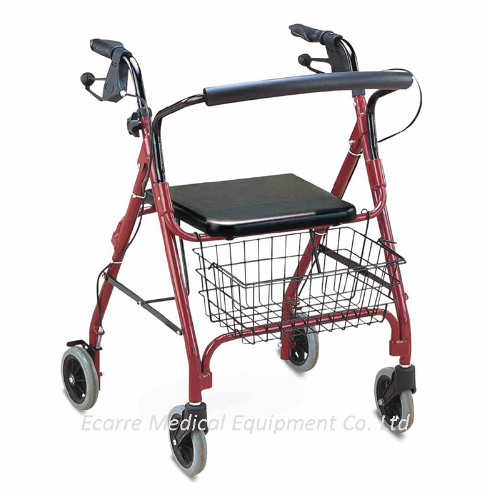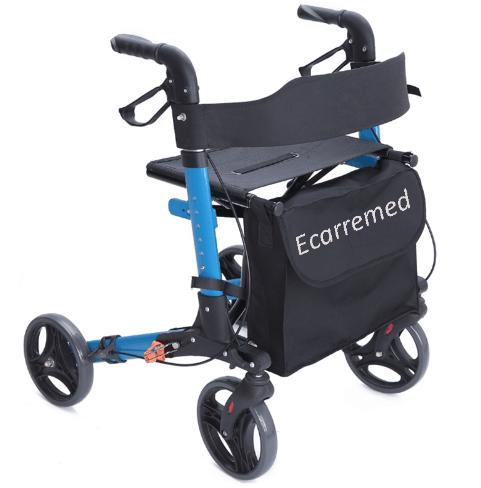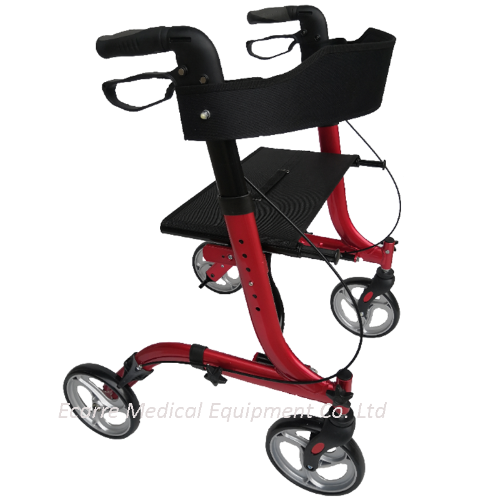Ultimate Guide: Help You Select the Right Rollator Walker
Choosing the right rollator walker can make a big difference in your daily life. Whether you're recovering from an injury, dealing with mobility issues, or just looking for a convenient way to move around, a rollator walker can provide the support and stability you need. However, with so many options available on the market, it can be challenging to determine which one is the best fit for you. In this article, we'll discuss some essential factors to consider when choosing the right rollator walker.
why A Rollator Walker is important?
A rollator walker is a type of mobility aid designed to help people with limited mobility move around more easily. It typically consists of a lightweight frame with four wheels, handlebars for support, and a built-in seat for resting. Rollator walkers can be used indoors and outdoors and are particularly useful for individuals with balance issues, chronic pain, or weakness in their legs.
Rollator walkers provide several benefits for mobility-impaired individuals. They can improve independence and quality of life by allowing individuals to perform everyday tasks like shopping or going for a walk. Rollator walkers also reduce the risk of falls and accidents, as they provide a stable and secure support system.
Furthermore, rollator walkers can help to alleviate pain and fatigue by reducing the amount of weight and pressure put on the legs and joints when walking. Overall, rollator walkers are an essential tool for many people with mobility impairments to maintain their mobility and independence.
Types of Rollator Walker
Rollator walkers are mobility aids that come in different types, each designed for specific needs and preferences. The three main types of rollator walkers are four-wheeled, three-wheeled, and bariatric rollator walkers.
●4 Wheel Walker Rollator
4 Wheel Walker Rollators have a wide frame and four wheels, providing greater stability and support for the user. They typically have a built-in seat and backrest, making them suitable for extended use. The wheels of these 4 wheel rollator walker with seat are usually large and provide excellent maneuverability, making them ideal for outdoor use. However, they can be heavy and difficult to maneuver in tight spaces, and they may not be suitable for use on uneven or rough terrain.
●3 Wheel Walker Rollator
Three-wheeled rollator walkers are lightweight and easy to maneuver, making them ideal for indoor use and tight spaces. They have a smaller turning radius, allowing for greater agility and mobility. They usually have a built-in basket or storage bag for carrying personal items. However, they may not provide as much stability as four-wheeled walkers, and they may not have a built-in seat or backrest for resting.
●Bariatric Rollator Walkers
Bariatric rollator walkers are designed to accommodate heavier users, with a wider frame and a higher weight capacity than standard rollator walkers. They provide greater stability and support, making them suitable for extended use. They may have larger wheels and stronger brakes for added safety. However, they can be heavier and more difficult to maneuver than standard rollator walkers, and they may not be suitable for use in tight spaces or narrow doorways.
In summary, each type of rollator walker has its own advantages and limitations, and the choice depends on the user's specific needs and preferences. It is important to carefully consider the features of each type before making a purchase.
In summary, each type of rollator walker has its own advantages and limitations, and the choice depends on the user's specific needs and preferences. It is important to carefully consider the features of each type before making a purchase.
7 Factors You need to Consider before Buying Rollator Walker
When it comes to choosing the perfect rollator walker, there are a number of factors to consider to ensure maximum comfort and safety for the user. Here are some key considerations to keep in mind:
●User's Height and Weight: One of the most important factors to consider is the user's height and weight. It's crucial to choose a rollator that can support the user's weight and is adjustable to their height. This will help ensure that the user can use the rollator safely and comfortably.
●Width and Depth of the Seat: The seat of a rollator is another important consideration. It's important to choose a rollator with a seat that is wide enough to provide comfortable seating for the user. The depth of the seat is also important, as it should be deep enough for the user to sit comfortably.
●Type of Brakes and Wheels: Rollators come with different types of brakes and wheels. When choosing a rollator, it's important to consider the type of brakes that will be easy for the user to operate, as well as the type of wheels that can handle the terrain on which the rollator will be used.
Most rollator walkers come with loop-lock brakes, which allow you to lock the wheels in place when you need to stop or stand still. However, some walkers also come with hand brakes, which provide additional control and support when going up or down slopes or inclines.
●The adjustability of the Handlebars and Height: The handlebars of a rollator should be adjustable to accommodate the user's height and provide a comfortable grip. It's also important to consider the adjustability of the height of the rollator itself, as this can help ensure that the user is able to use the rollator safely and comfortably.
●User's Height and Weight: One of the most important factors to consider is the user's height and weight. It's crucial to choose a rollator that can support the user's weight and is adjustable to their height. This will help ensure that the user can use the rollator safely and comfortably.
●Width and Depth of the Seat: The seat of a rollator is another important consideration. It's important to choose a rollator with a seat that is wide enough to provide comfortable seating for the user. The depth of the seat is also important, as it should be deep enough for the user to sit comfortably.
●Type of Brakes and Wheels: Rollators come with different types of brakes and wheels. When choosing a rollator, it's important to consider the type of brakes that will be easy for the user to operate, as well as the type of wheels that can handle the terrain on which the rollator will be used.
Most rollator walkers come with loop-lock brakes, which allow you to lock the wheels in place when you need to stop or stand still. However, some walkers also come with hand brakes, which provide additional control and support when going up or down slopes or inclines.
●The adjustability of the Handlebars and Height: The handlebars of a rollator should be adjustable to accommodate the user's height and provide a comfortable grip. It's also important to consider the adjustability of the height of the rollator itself, as this can help ensure that the user is able to use the rollator safely and comfortably.
●Foldability and Portability: If you plan to travel with your rollator, it's important to consider how easy it is to fold and transport. Look for a rollator that is lightweight and easy to pack. A rollator walker that can be easily folded and stored is much more convenient, especially if you need to transport it frequently.
Some models can be folded with one hand, while others require more effort. Also, you should consider the weight of the walker when it's folded, as this can affect how easily you can carry or transport it.
●Storage and Accessories: Many rollators come with storage options such as a basket or pouch to carry personal items. Consider if additional accessories like cup holders or trays are important to the user.
By taking these factors into consideration, you can choose a rollator walker that is tailored to your needs and provides safe and comfortable mobility.
Conclusion
In conclusion, choosing the right rollator walker requires careful consideration of various factors. You should take into account your height and weight, the type of wheels, the brakes, the seat and storage, and the foldability of the walker. By taking the time to research and evaluate your options, you can find a rollator walker that meets your specific needs and provides you with the support and stability you need to maintain your independence and mobility.










